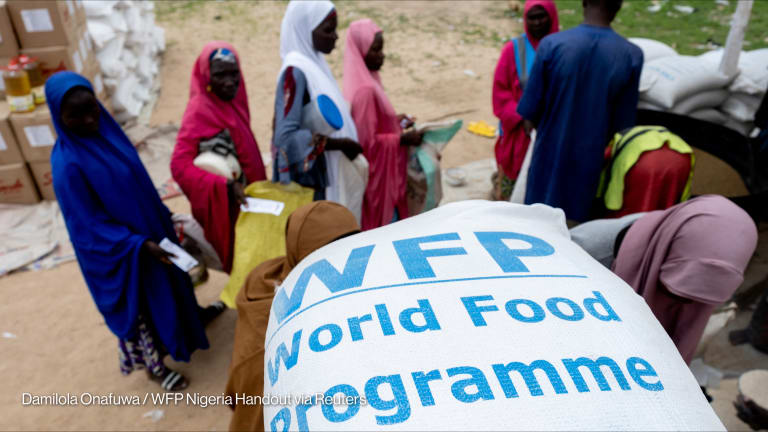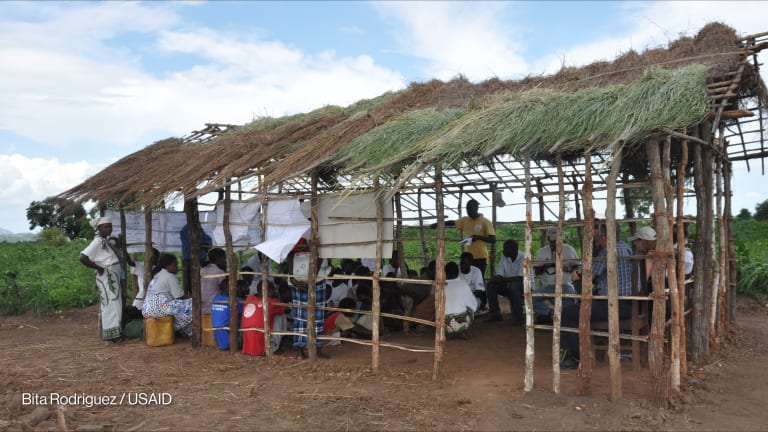
Leaders from the G-7 group of leading industrial nations on Tuesday pledged contributions totaling $4.5 billion to address the deterioration of global food security due to Russia’s war in Ukraine and the continued effects from COVID-19 and climate change.
More than half of that amount will come from the U.S., which announced $2.76 billion in new funding for a variety of short-, medium-, and long-term impacts on the food system.
Citing the United Nations’ Global Crisis Response Group on Food, Energy and Finance, the G-7 statement said as many as 323 million people globally will become acutely food-insecure or are at high risk, setting a record high. The number of severely food-insecure people has increased by more than 200 million in just two years, and 50 million people across 45 countries are on the edge of famine, according to the World Food Programme.
“We will cooperate closely with international partners beyond the G7 with the aim of transforming political commitments into concrete actions,” a G-7 statement said, noting the group’s joint creation of the Global Alliance for Food Security with the World Bank. “We urge our partners, including the private sector, to join us in our efforts to increase solidarity towards the most vulnerable.”
Get the inside track on how agriculture, nutrition, sustainability, and more are intersecting to remake the global food system in this weekly newsletter.
The U.S. Agency for International Development will provide $2 billion to meet emergency humanitarian needs over the next three months. The money will support direct food assistance along with related nutrition, protection, health, water, sanitation, and hygiene services for countries with high levels of acute food insecurity. It will also assist countries that rely heavily on Russian and Ukrainian imports, are vulnerable to price shocks, or host refugee populations.
A statement from WFP said it was “encouraged” by G-7 commitments to keep trade open to help mitigate shortages of food, fertilizer, and fuel.
“The world stands at a critical crossroads. Either we rise to the challenge of meeting immediate needs at scale while at the same time supporting programmes that build long term resilience at scale, or we will face even bigger problems down the line,” the U.N. agency said.
“Today’s pledge by the G7, which takes its joint commitment this year to over US$ 14 billion to global food security, is an important step towards meeting this challenge,” WFP added.
The U.S. will also provide $760 million in development assistance to strengthen food systems and address medium-term food insecurity. It will target over 40 of the most vulnerable countries, including 24 nations and regions in Africa, 10 countries in Asia, six nations and regional activities in Latin America and the Caribbean, and six countries in the Middle East.
The money will support initiatives from several multilateral institutions, including the African Development Bank’s African Emergency Food Production Facility, the International Fund for Agricultural Development’s Crisis Response Initiative, the Africa Adaptation Initiative, and African Risk Capacity’s Africa Disaster Risk Financing Programme, as well as the Food and Agriculture Organization to fund soil mapping.
USAID will expand Feed the Future, the United States’ flagship initiative for global food security, to eight new countries affected by the war in Ukraine: the Democratic Republic of Congo, Liberia, Madagascar, Malawi, Mozambique, Rwanda, Tanzania, and Zambia.
Meanwhile, $155 million will go to the Global Agriculture and Food Security Program “to support projects that raise agricultural productivity, link farmers to markets, improve livelihoods, reduce vulnerability, and enhance resilience to shocks.”
The G-7’s statement announcing the $4.5 billion did not provide details on where the remaining funding would come from. Last week, the United Kingdom announced £372 million (roughly $450 million) to assist countries affected by the food and fertilizer shortage.
While some nutrition advocates lauded the G-7 for specifically mentioning the fight against malnutrition, The Power of Nutrition CEO Simon Bishop said the commitments are only “a fraction” of what is actually needed.
“Part of the problem is the world just can’t get its head around the enormity of the malnutrition coming down the track,” Bishop told Devex.
“The bit that frustrates me is the G-7 leaders do know what’s coming. We’ve got the U.N. secretary-general saying we’re going to have multiple famines this year, and it could get worse next year. So they do know what’s coming, and therefore they should be showing real leadership in the response. And it was just nowhere near enough, what they've come up with over the last couple of days.”
Bishop said he was relieved that the statement from G-7 countries went beyond “the usual ‘calories in bellies’ approach” by recognizing the importance of nutritious food outside of just rice and wheat.
“It is good to see them acknowledge malnutrition is such an issue and nutrition is part of the solution,” Bishop said, adding that he awaits more details on the G-7’s plans.
“You need an unprecedented response — literally unprecedented. And we’re not seeing that at all.”









